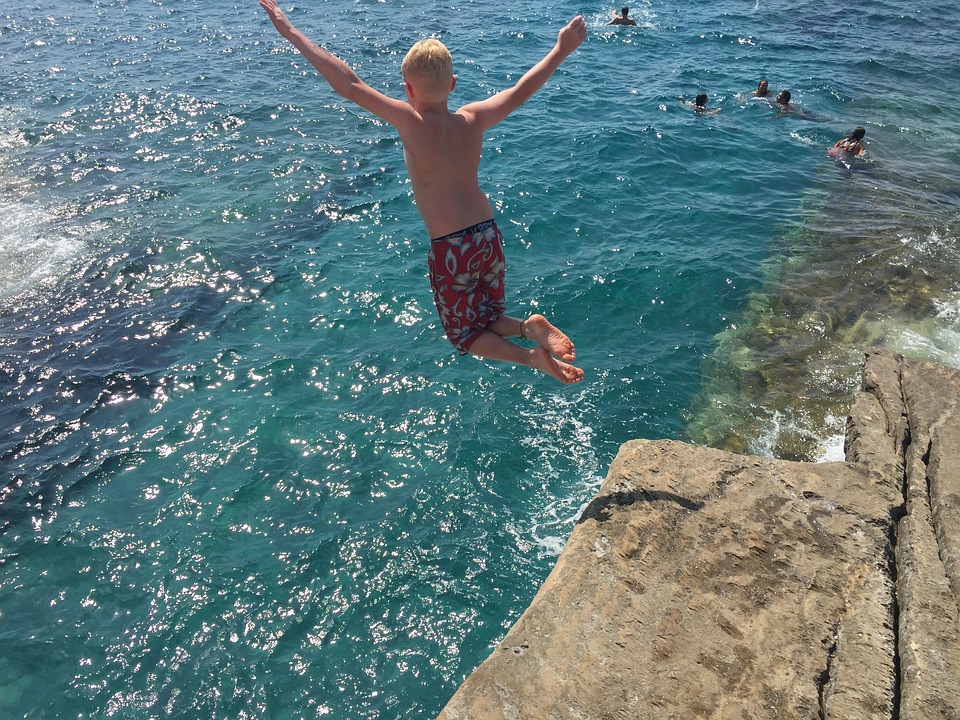Plymouth police and city council have joined forces to campaign against tombstoning.
Followng the death of a man in Plymouth last year and many serious injuries from tombstoning, the campaign is highlighting the risk of tombstoning, which include:
- High risk of death or life-changing injuries (20% of cases involve spinal or limb injuries)
- Water depths change with the tide – the water may be more shallow than it seems;
- Submerged objects like rocks may not be visible;
- The shock of cold water can make it difficult to swim;
- It may be difficult to get out of the water and strong currents can rapidly sweep people away.
Insp Robin Loveridge said: “Police have seen an increase in calls regarding groups of people tombstoning in the waterfront areas of the city. We are working in partnership with the local authority and the waterfront BID to tackle these issues, educate those individuals on the dangers and reduce the demand on the police and health staff.
“In recent years Plymouth has seen tragedy as a result of what some consider a fun activity. This includes the death of a man last year as he hit the rocks jumping from the Hoe foreshore and other tragic incidents where many people have been seriously injured. In August 2016 a 17-year-old received life changing injuries and last year a 14-year-old was described as being lucky to be alive following diving headfirst onto rocks and being rescued by the coastguard.”
Councillor Dave Downie, Cabinet Member for Safer and Stronger Communities for Plymouth City Council said: “We are pleased to work with Devon and Cornwall Police and other partners to do all we can to help keep people safe.
“During the summer holidays, tombstoning tends to increase and this may be partly due to more free time and boredom so it’s really important that we continue to make people aware of the dangers and know what risks to look out for, but also to ensure there are other activities available for young people in the city, such as those in our Summer Mix activity programme.”
Area Lifesaving Manager for the RNLI Dickon Berriman said: “Conditions can change quickly and anyone considering jumping into the sea from height should always check for hazards in the water like submerged rocks and know where the best access out of the water is.
“It’s really important that people think about the possible dangers. People should never jump while under the influence of alcohol, drugs or peer pressure. Coasteering with a registered company may be a safer alternative.”
Young people aged 11-19 (or up to 25 with a disability) can still sign up to the Summer Mix activity programme – find out more: https://www.plymouth.gov.uk/summermix
To find out more about the dangers go to: https://www.devon-cornwall.police.uk/advice/coastsafe/tombstoning/
It is essential that everyone who lives by the coast is aware of how to stay safe. Things to look out for include:
- Check for hazards in the water. Rocks or other objects may be submerged and difficult to see
- Check the depth of the water. Remember tides can rise and fall very quickly
- As a rule of thumb, a jump of ten metres requires a depth of at least five metres
- Never jump whilst under the influence of alcohol or drugs
- Check for access. It may be impossible to get out of the water
- Consider the risks to yourself and others. Conditions can change rapidly – young people could be watching and may attempt to mimic the activity. And, if you jump when you feel unsafe or pressured, you probably won’t enjoy the experience.
The RNLI video on tombstoning is on their Facebook page here: https://www.facebook.com/rnli/videos/10153555220948999/
Royal Society for Prevention of Accidents (RoSPA) has a range of information and resources on their website here: https://www.rospa.com/leisure-safety/water/advice/tombstoning/
[do_widget id=text-36]
Return to our home page for more local news here.
You can join us on our social media pages, follow us on Facebook or Twitter and keep up to date with whats going on in South Devon. Got a news story, blog or press release that you’d like to share? Contact us






























